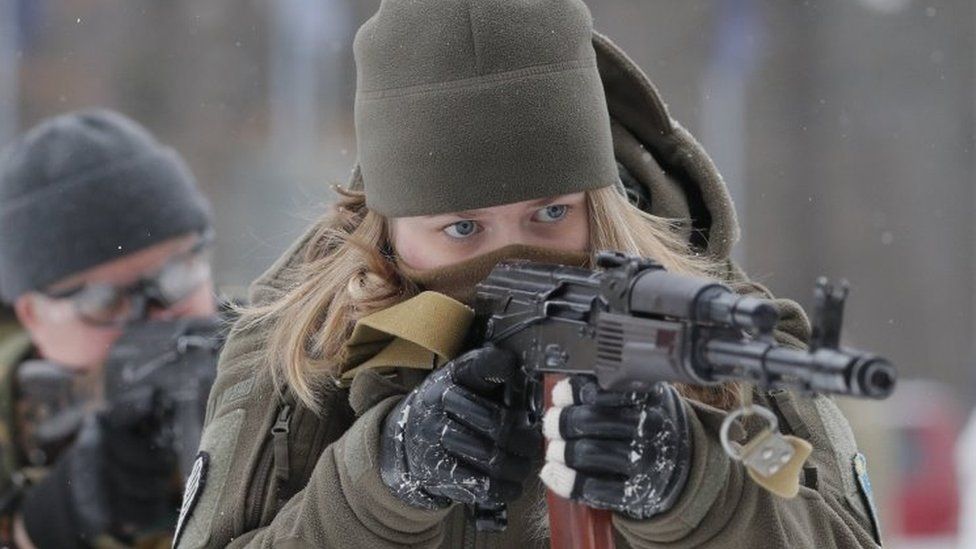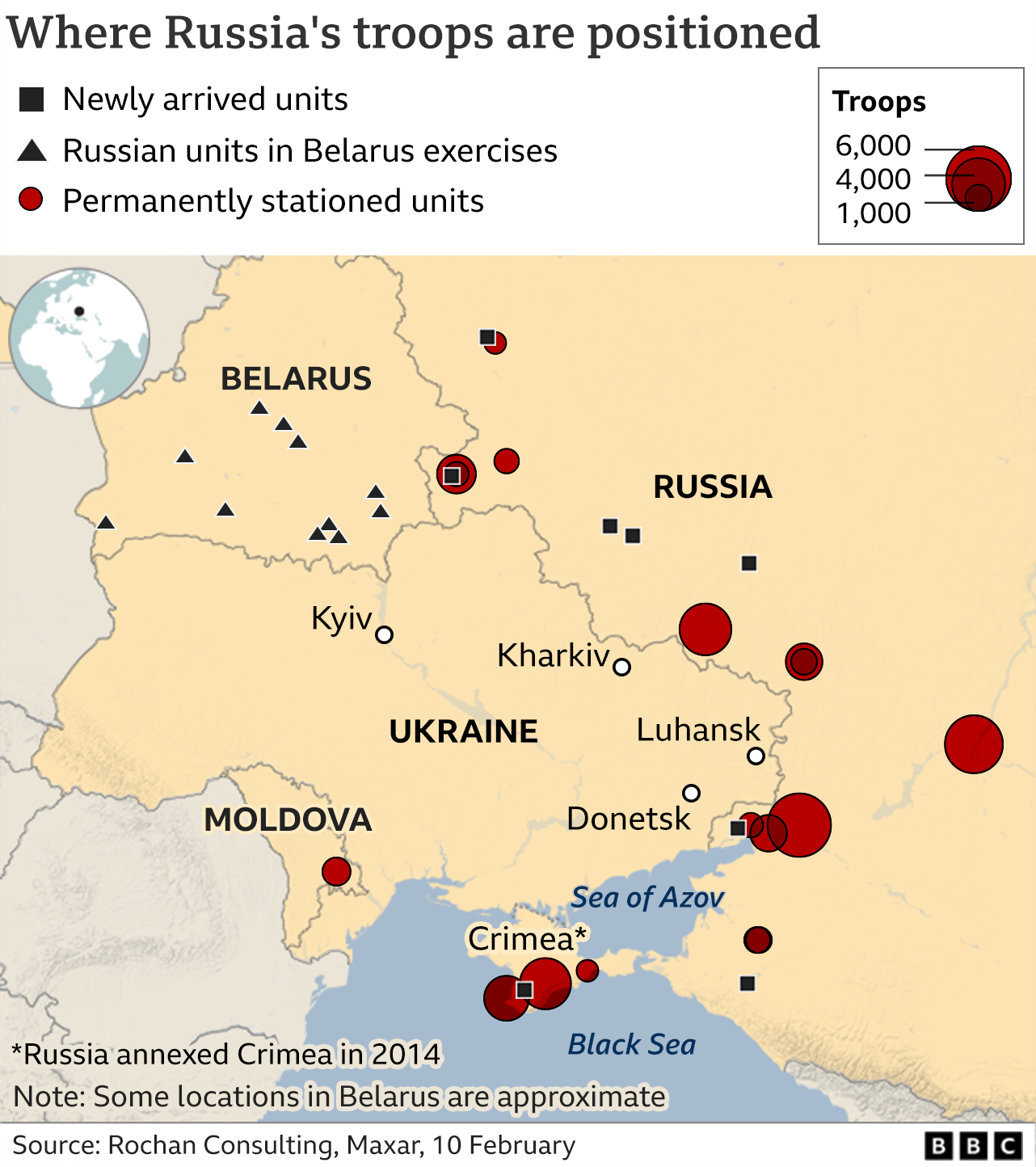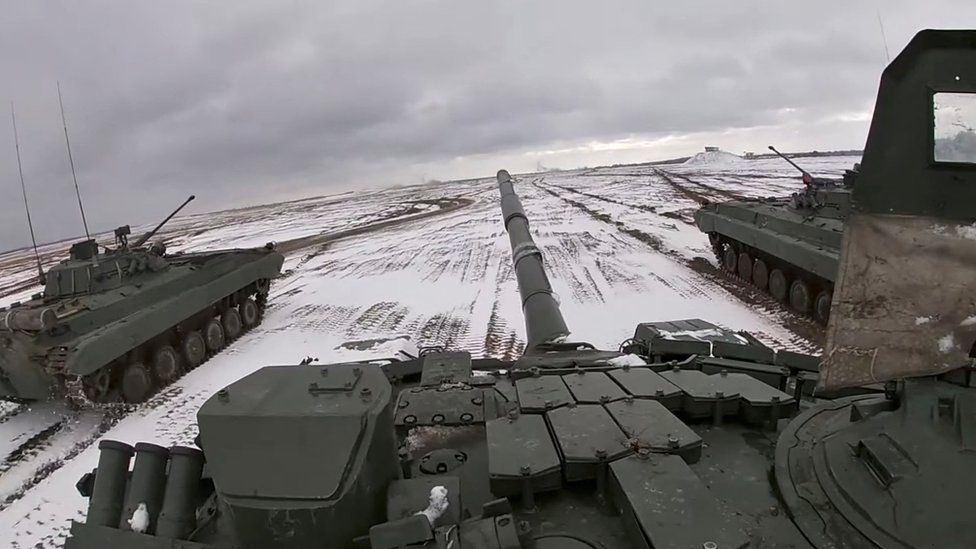? Ukraine tensions: Can diplomacy prevent war
By James Landale
Diplomatic correspondent
Published14 hours ago
 SOURCE, REUTERS
SOURCE, REUTERS
Image caption, Territorial defence reservists across Ukraine have been preparing for a possible Russian invasion
The prospect of a wider war in Ukraine is dreadful to contemplate. If Russia were to invade, thousands could die. Many more might flee.
The economic cost would be severe, the humanitarian cost devastating.
Yet Russia continues to build up its forces around Ukraine, and the West continues to threaten dire consequences if they were to step one foot over the border.
So is there a diplomatic way out, an exit from this confrontation that is peaceful and durable?
Diplomats talk of an "off ramp", a way that all sides can get off the road to war. But finding such a path is not easy.
Any compromise would come at a price. Here, though, are some potential routes that do not involve a military and thus bloody outcome.
The West could persuade President Putin to back down
Under this scenario, Western powers would effectively deter any invasion by convincing Russian President Vladimir Putin the costs would outweigh the benefits.
He would be persuaded that the human casualties, the economic sanctions and the diplomatic blowback would be so great that he would come off worst even if he made military gains on the battlefield.
He would have to fear the West might support a military insurgency in Ukraine, thus bogging him down in a costly war for years.
Mr Putin would have to believe these costs would reduce his domestic support and thus threaten his leadership.
Under this narrative, the West would also have to allow Mr Putin to claim a diplomatic victory, portraying himself as a peaceful protagonist who had been unwilling to respond militarily to Nato provocations.
Mr Putin could claim he had finally got the West's attention and its leaders were addressing what they called his "legitimate security concerns". Russia would have reminded the world it was a great power and deepened its presence in Belarus.
The difficulty with this narrative is that it would be just as easy to argue Mr Putin had failed. His actions would have united the West; led Nato to move forces closer to Russia's borders; and encouraged Sweden and Finland to consider joining Nato.
The problem is that if Mr Putin wishes to control Ukraine and undermine Nato, there are few reasons why he might back down now.
Nato and Russia could agree a new security deal
Western powers have made clear they will not compromise on core principles, such as the sovereignty and territorial integrity of Ukraine; its right to seek membership of Nato; which must have an "open door" to any country that wishes to join.
But the US and Nato have, nonetheless, accepted that common ground could be found on wider European security issues.
This could include a revival of lapsed arms control agreements to reduce the numbers of missiles on both sides; the beefing up of confidence building measures between Russian and Nato forces; greater transparency over military exercises and the location of missiles; and co-operation on anti-satellite weapon testing.
Russia has already made clear these issues would not be enough to satisfy its core concern that allowing Ukraine to join Nato would come at a cost to Russian security.

 But if, say, Nato missile deployments were significantly reduced, that could address at least some Russian concerns.
But if, say, Nato missile deployments were significantly reduced, that could address at least some Russian concerns.
In some ways, Putin has already made gains here: Europe is newly engaged in a security dialogue on Russia's terms.
Ukraine and Russia could revive the Minsk agreements
This was a package of deals negotiated in 2014 and 2015 in the Belarusian capital, Minsk, that was designed to end the war between government forces and Russian-backed rebels in eastern Ukraine.
It obviously failed - the fighting continues. But it at least set out a path towards a ceasefire and a political settlement based on a more federal constitution.
 SOURCE, RUSSIAN DEFENCE MINISTRY
SOURCE, RUSSIAN DEFENCE MINISTRY
Image caption, Thousands of Russian troops have arrived in Belarus for joint military drills
Western politicians have suggested reviving the Minsk accords could now be a solution to this crisis.
French President Emmanuel Macron said Minsk was "the only path allowing us to build peace".
Defence Secretary Ben Wallace told the BBC Today Programme that restoring Minsk would be "a strong way forward to de-escalate".
The problem is that the provisions of the agreement are convoluted and disputed.
The Kremlin demands that Ukraine must hold local elections to empower pro-Russian politicians. Kyiv wants Moscow first to disarm and remove Russian fighters.
The biggest dispute is over how much autonomy Minsk would give to breakaway enclaves in the Donbas. Kyiv says modest self-government. Moscow disagrees and says Donetsk and Luhansk should have a say over Ukraine's foreign policy and thus a veto over Nato membership.
And that is the big fear in Kyiv: that reviving Minsk is shorthand for ruling out Ukraine ever joining Nato without Nato members explicitly having to say so. Thus agreement and popular support in Ukraine is unlikely.
Ukraine could become neutral, like Finland
? Could Ukraine be persuaded to adopt some kind of neutrality
There have been reports - subsequently denied - that French officials suggested Ukraine could take Finland as a model.
Finland adopted formal neutrality during the Cold War. It was an independent, sovereign and democratic state. It remained - and remains - outside Nato.
Could this be attractive to Kyiv? It would avoid a military outcome. It might, in theory, satisfy Mr Putin's desire for Ukraine never to join Nato.
And the alliance would not have to compromise on its "open door" policy: Ukraine would have made its sovereign choice not to join.
But would Ukraine support this? Probably not because neutrality would effectively leave Ukraine open to Russian influence.
It can be hard to enforce neutrality, and would Russia abide by its terms? Neutrality would be a major concession by Kyiv which would have to abandon its Euro-Atlantic aspirations.
Neutrality might also make membership of the European Union even more distant.
The current stand-off could become the status quo
?Might it be possible for the current confrontation just to linger on - but diminish in intensity over time
Russia could slowly pull its troops back to barracks, declaring their exercises over. But at the same time a lot of military equipment could be left behind, just in case.
Moscow could continue supporting rebel forces in the Donbas. And all the while, Ukraine's politics and economy would continue to be destabilised by the constant threat from Russia.
In turn, the West would maintain a strengthened Nato presence in Eastern Europe. Its politicians and diplomats would continue to engage sporadically with Russian counterparts, where talks continued - but little substantive progress was made.
Ukraine would struggle on. But at least there would be no full-scale war.
And slowly the confrontation would fade from the headlines and re-join the long list of frozen conflicts that disappear from public attention.
None of these options is easy or likely. They all involve compromise.
The fear in Kyiv is that Ukraine might be the country that has to compromise the most. The calculation, though, is whether the threat of devastating conflict is real and if so, what could be done to avoid it.
The one vestige of hope right now is that all sides still seem willing to talk, however fruitlessly. And the longer people keep talking, the longer the diplomatic door to a solution remains open, even if it be just ajar.
BBC







